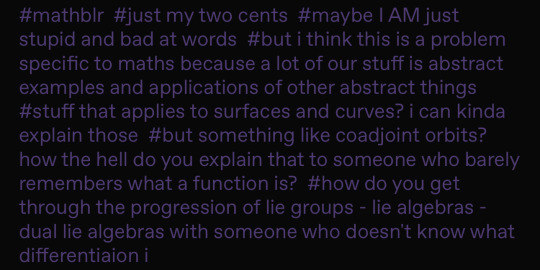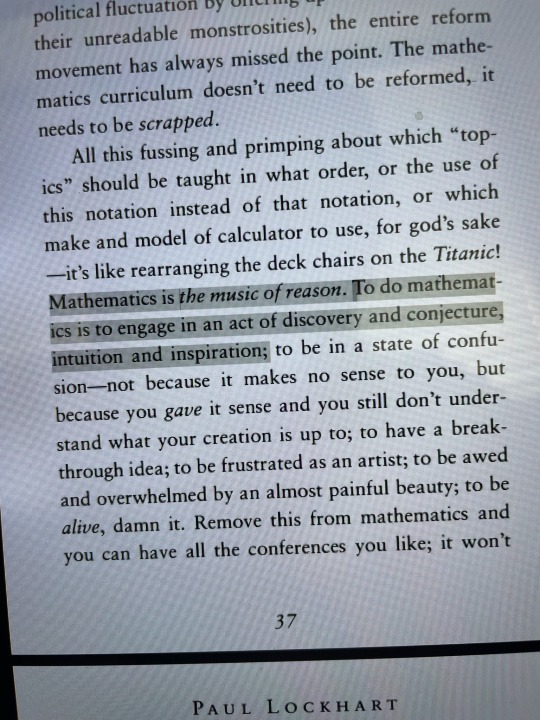Text
Caption: [A stitch with user @/sapphicyuji. The text on screen reads, " "you can't misgender cis people!", you have never had your gender questioned outside of your transness and it shows. sincerely, a trans poc".
I'm actually super glad we're having a conversation about this. The masculinization of black and brown women, because for years I felt like I endured this unique form of trauma until I realized other people went through the same thing too. And if there's one thing that I'd like to add to the conversation, there seems to be this misconception that this is something that starts at puberty. Like boys tell you you look like a man to hurt your feeling when that's so far from the case.
The first time I was purposefully misgendered was in kindergarten. I was constantly referred to by the masculine variant of my name, I was chased out of the women's restroom, and I had grown adults questioning what my biological sex was before I even knew what the difference was. And those behaviors persisted into adulthood because now if I present as anything less than 100% feminine, people will either compare me to men or animals.
And for myself and for many other brown and black women this is a life long act deliberately intended to humiliate, shame, and other us for the features we were naturally born with and I'm glad we're having a discussion on how harmful it actually is.]
39K notes
·
View notes
Text

I had a whole other draft on this account talking about this, but it might be best if I start from scratch.
I think a lot of it comes down to education and expectation of what math is. It’s not that we don’t teach math per se, but rather that we teach math strictly as an application we use to deal with problems. As a result what people learn about math is that it’s sole purpose is to be “useful” and while this is a problem for many of the subjects taught from pre-k to junior college. Most subjects let you see their true colors through the vale of obstruction.
I mean the first engineering class is a 101 level class, but the first math class requires calculus II (to take introduction to proofs) at my college. And introduction to proofs is certainly not taught to anyone who didn’t search for it much less know what it is. Math education in the us is strictly targeting engineers and scientists, but it refuses to give people a taste of mathematics.
I mean the other day I was talking to an engineer about my major and he tried to connect with me using PDEs which is a hard subject and one that isn’t really to be trifled with, but it isn’t exactly what math is about precisely. It’s a useful tool that physicists and mathematicians developed to solve a set of problems, but at least from my level of understanding, that isn’t what math is about. It’s part of it, but not the full context.
I think mathematics is taught so late that even entry level math majors find themselves increasingly unable to celebrate their accomplishments with non-math peers - this includes people who otherwise are included in stem.
In a strange sense this isn’t about difficulty though. Like I don’t think of logic, proofs or sets, to be outside people’s ability. And I find it weird that people react to this stuff as if it’s alien. I think algebra - I mean a brought abstract sort of algebra - isn’t out of reach. I don’t like how “algebra” means something specific in the context of math even when I find it could be much better used to describe a much more general concept. It bothers me that number theory and group theory and combinatorics are all taught as an application and not for the joy of it. For the love and celebration that comes with that.
I think it’s wild that I can’t find any pure books on introductory logic that aren’t a century old and mostly out of date - I’m a stickler for notation - even in fields that would benefit from its pure, unapplied practice like law, philosophy computer science/programming. I’m not saying that these fields don’t teach it, but I’m surprised that none of them devote time to it out side of a class that might use it for things.
To focus back on the original post. I agree with op, but I also think that it’s not just the standard track that people are missing but that they lack a mathematical foundation or framework to build up from. This isn’t because people are stupid but the work of a system that hates things that don’t explicitly make money or increase productivity.
One frustrating thing about being a mathematician is that people who aren't into math heard that Einstein quote that's like "you haven't understood something unless you can explain it in layman's terms" and use it to mean "if it can't be explained to me in five minutes it's needlessly complicated, this person is a pretentious snob and academia is gatekeeping knowledge". And like everything in life, the matter of scientists not being able to/not caring to explain their work to people who aren't at the same level of expertise as them is a complex one that is worthy of being discussed, but here's the thing that you have to keep in mind if you haven't done math since high school:
the further you get into math, the more specialized your field becomes. You start working of puzzles that are small, but fit into a greater web of similar problems, like knitting a beautiful flower that's meant to be incorporated into a huge quilt. And all of math is build on top of each other, so you can't get to the most interesting, current math being discussed in the world without getting through the building blocks that are taught to you in elementary school, high school and the university.
You ask me to explain my thesis to you and I can tell you the title, but you won't know what the main words in it mean. And that's not because you are stupid, that's just because to learn that word you have to spend time learning a hundred others. I love math, it's my favourite thing in the universe and I always have time to talk about it, so if you want, we can sit down and I'll tell you everything you need to know to understand what I'm currently working on. You can ask me questions and I will reformulate, you can ask me to go over things again and I will oblige. With your permission, I will get a piece of paper and draw shapes and schemes to help us, but it won't take five minutes. It can't take just five minutes. That is a concession you will have to make if you truly want to learn.
(Unfortunately, I don't want to disclose the title of my thesis on tunglr dot hell, because it's super specific and I don't feel like doxxing myself. But I hope this resonates with some people. I work both in symplectic geometry and Riemannian geometry, and I have to say between the two Riemannian is a little bit easier to explain, because I can just talk about distances, but symplectic geometry or Lie groups... I'm afraid I just can't explain those in a sentence because they rely on people knowing what differentiation means, and that's not knowledge you necessarily retain if you work outside a stem field. Explaining that in a few sentences would eat up the whole five minutes).
#in a lot of ways mathematics is lonely for this reason.#it takes like two semesters and then most people can’t even talk to you about your work even if they are an engineer or a computer scientist#mathblr#mathematics#math
396 notes
·
View notes
Text
@then-ponder
It is April which means it is time for my approximately annual
mathblr roll call!
Reblog/reply if you are a mathblr and/or mathblr adjacent. And tag the other (at least semi active) mathblrs & adjacents you know of!
"What counts as mathblr? Do I count?" If you want to! Math shitposters! Math academia aesthetic blogs! Math studyblrs! Unthemed blogs owned by people who happen to be math fans! I want them all! I'm happy to see CS, stats, physics, and other math-adjacent folks too if they like hanging out with the math crowd!
And while we're at it, here is the link once again to the mathblr discord server (LCM- Least Common Mathblr). It's a good time and all are welcome :)
https://href.li/?https://discord.gg/JfRj3wxcwX
280 notes
·
View notes
Text
One frustrating thing about being a mathematician is that people who aren't into math heard that Einstein quote that's like "you haven't understood something unless you can explain it in layman's terms" and use it to mean "if it can't be explained to me in five minutes it's needlessly complicated, this person is a pretentious snob and academia is gatekeeping knowledge". And like everything in life, the matter of scientists not being able to/not caring to explain their work to people who aren't at the same level of expertise as them is a complex one that is worthy of being discussed, but here's the thing that you have to keep in mind if you haven't done math since high school:
the further you get into math, the more specialized your field becomes. You start working of puzzles that are small, but fit into a greater web of similar problems, like knitting a beautiful flower that's meant to be incorporated into a huge quilt. And all of math is build on top of each other, so you can't get to the most interesting, current math being discussed in the world without getting through the building blocks that are taught to you in elementary school, high school and the university.
You ask me to explain my thesis to you and I can tell you the title, but you won't know what the main words in it mean. And that's not because you are stupid, that's just because to learn that word you have to spend time learning a hundred others. I love math, it's my favourite thing in the universe and I always have time to talk about it, so if you want, we can sit down and I'll tell you everything you need to know to understand what I'm currently working on. You can ask me questions and I will reformulate, you can ask me to go over things again and I will oblige. With your permission, I will get a piece of paper and draw shapes and schemes to help us, but it won't take five minutes. It can't take just five minutes. That is a concession you will have to make if you truly want to learn.
(Unfortunately, I don't want to disclose the title of my thesis on tunglr dot hell, because it's super specific and I don't feel like doxxing myself. But I hope this resonates with some people. I work both in symplectic geometry and Riemannian geometry, and I have to say between the two Riemannian is a little bit easier to explain, because I can just talk about distances, but symplectic geometry or Lie groups... I'm afraid I just can't explain those in a sentence because they rely on people knowing what differentiation means, and that's not knowledge you necessarily retain if you work outside a stem field. Explaining that in a few sentences would eat up the whole five minutes).
396 notes
·
View notes
Text
I am working on a way to work on differential equations that is different then just about everything I’ve seen and it seems that it is novel to my professor, which is wierd considering it’s literally just difeq and geometric algebra.
Much of this work feels like it should have been done already yet when I look up things that I need for this I find nothing like how do you find the magnitude of a n by m matrix? Or matrix as a multi vector. This in my mind should be something trivial and talked about at a less than undergraduate level. But it isn’t. I also find that the idea of matrices as multi vectors intuitive but seemingly novel.
I say this not to compare our work but to say that the forefront of human knowledge is not uniform and the set of what we know is shaped by what we have attempted to understand. Much of mathematics is based on a real world need or application not for a quest or thirst. This is the nature of research and academic work. We push the bounds of knowledge no matter where it is.
I think I just proved something big, but now I'm afraid I've missed something. If it works it means that a whole bundle of algorithmic techniques can be applied very effectively to something they've never been applied to before, so I feel like I'm just not lucky enough of a person to really have made such a substantial discovery. Yet, the proof seems correct, and I feel like I have very clear intuition to supplement the proof.
36 notes
·
View notes
Text
Yesterday I met with my professor to talk about my senior thesis and we were working with wolfram cloud/mathmatica and he named two functions pp1 and pp2.
I’m so sorry professor. I didn’t mean to laugh. I love your functions, but pp1 and pp2? I get to be a little bit immature at the end of the day
2 notes
·
View notes
Text
Great icosahedron requested by @ardgonian




Rather unclear where to put the eyes so I did some with and without. Also, this shape fucks.
492 notes
·
View notes
Text
The biggest problem I have with magnetism is that it requires calculus to properly explain everything. Like sure I could hamfisting my way out of bs but ultimately you kind of need integrals and derivatives. You also need pseudo vectors but that’s another issue and specifically relating to lens laws.
2 notes
·
View notes
Text
The first part:
Commutativity is when an operation doesn’t need to be ordered to be equal. The most common example is when a+b = b+a. When a+b ≠ b+a we say it’s non-commutative. This doesn’t mean this is impossible but it does make the arithmetic [usually but not always] more annoying.
Associativity happens when a+(b+c) = (a+b)+c it asks if the order of operations changes the outcome of the expression. In this case it meant that applying gender onto a person is order dependent. If someone has a gender that’s the product of 3 genders then it means that calling them a (cat*boy)*girl is different than a cat*(boy*girl).
This isn’t to be confused with associativity from before. We are not saying that the order of the operation matters, but that the order in which we do the operation matters.
Part two:
Disclaimer: I haven’t taken a formal catagory theory class so this might be off by a lot
Conjectures are statements that mathematicians think are true but haven’t proved [Hammock 173]. When OP says “I’d be surprised if it was associative as well” that is a conjecture in the lightest sense. Conjectures are useful in speculative research, where mathematicians prove things that are dependent on a fact being true. For some of the bigger ones there are hundreds in not thousands of proofs waiting for them.
What I will call ε’s conjecture states that OPs gender is isomorphic to boy^{-1}girl^{-1}boygirl.
An isomorphism is a mathematical structure that is the same as the object presented. This doesn’t mean equality, that they are the same “value”. They aren’t equal. And op doesn’t have the gender boy^{-1}girl^{-1}boygirl. But it is the same form.
What op is saying is that their gender is structurally the same as the gender boy^{-1}girl^{-1}boygirl.
The fact that boygirl adequately explains my gender but girlboy does not implies that gender is noncommutative. I’d be surprised if it was associative too.
3K notes
·
View notes
Text
If he leaks toxic waste then someone should probably call @osha-unofficial or @osha-official-2.

1K notes
·
View notes
Text
learning mathematics from a pure perspective is very fun, but It also puts holes in a lot of math that are taught to non-mathematicians. For instance, I hated the cross product because it was useful but it lacked generality (n-dimensional). I took physics twice before I found the wedge product. And let me tell you how much I felt vindicated.
the thing is, I have that same feeling for matrix multiplication. I feel like there should be a general form of a matrix product that can handle two matrices of varying orthogonality.
This is a miss use of orthogonality, but its the best way to communicate that if you have a n by m matrix [A] and a p by q matrix [B] then as [A] moves in and out of the space containing [B] then the perpendicular product between these matrices is also changing.
I feel like there is a more generalizable form of this product, but It could just be that I am a young mathematician. I'm mostly looking into this because one of my projects this semester is trying to describe this idea I had involving systems of differential equations.
#differential equations#difeq#linear algebra#math#mathblr#mathematics#geometric algebra#physics#learning to fly
14 notes
·
View notes
Text
I have posted (perhaps on other blogs) how I feel about this whole topic. I am always happy to hear that teachers and even professors are reading that book in particular, though I think that
The problem is systemic and while this book does take aim at teachers, it really is about the system.
This isn't just about maths. I'm sure you're aware that this also applies to all the stem fields including engineering.its only felt so closely to mathematics because of how striped down math becomes when you only care about its utility. likewise, this same thing has been happening to the arts for generations and english is currently on the chopping block.
Its been a while since Ive read the book, but my biggest grip is that there are meaningful ways to upset this cycle even if it's one person at a time.
Remember. Sparking a love of math is easiest when you enjoy math for maths sake. This means that you need to introduce students to math outside of what is essentially {and self admittedly some what derogatorily} advanced arithmetic.
The foundations of math is sets and logic. Technically you only need logic. Math is built on axioms, arbitrary choices that result in logical conclusions. the basic arithmetic doesn't have to be associative or distributive. We just work with an arithmetic that does.
If you need free resources, I recommend the The Book of Proofs by Richard Hammock[available on his website for free or physical at cost]. It is the best introduction to entry level pure maths I have seen. Students won't need to know that much prerequisites and the advanced high school topics can be largely skipped. It is a book of proofs, so while it engages with math directly, its focus is on the most important mathematical skill. Skip chapter 3 unless at least one of you has an interest in that book.
Reading through “A Mathematician’s Lament” and stumbled on this quote.

Like the whole book is a revelation as to why I’m scared of solving the area of a regular polygon, but also it’s depressing because I have seen some of my former students go through the same anxiety I did and believe that math isn’t for them. Like. There’s a whole world out there for them! Math is beautiful but they will never get to see it because we cut out their chests before they had a chance to feel math the way it was meant to be felt!!
20 notes
·
View notes
Text
I think it’s rather strange how much trying to draw something and trying to figure out math feel the same to me.
Reading through “A Mathematician’s Lament” and stumbled on this quote.

Like the whole book is a revelation as to why I’m scared of solving the area of a regular polygon, but also it’s depressing because I have seen some of my former students go through the same anxiety I did and believe that math isn’t for them. Like. There’s a whole world out there for them! Math is beautiful but they will never get to see it because we cut out their chests before they had a chance to feel math the way it was meant to be felt!!
20 notes
·
View notes
Text
The real reason magnets do that is because they are perverse sexual beasts
19K notes
·
View notes
Text
The real reason magnets do that is because they are perverse sexual beasts
19K notes
·
View notes
Text
It’s proportional and orthogonal to the velocity of the person entering its field, the direction of that field times the charge of that person
The real reason magnets do that is because they are perverse sexual beasts
19K notes
·
View notes
